If you’ve discovered that your household suffers from hard water problems, you might be searching for a solution. And if you haven’t, it’s a good idea to get your water tested because there’s a good chance this is a problem for you as well. When it comes to this, water softeners will help a lot. Salt-based water softeners seem to be the most common and successful among the various types of water softeners. They’re extremely capable of ensuring that your entire home is clean of hard water.
To regenerate your softener, you must know everything there is to know about water softener salt. Since they are not all equally powerful on every unit, picking the right one will make all the difference. Furthermore, some of these salts can be harmful to your health if you have such medical conditions.
This reading will help you in selecting the correct salt. Here you’ll find a list of all the considerations you can make when purchasing salt for your water softener. But first, let’s take a peek at some of the best water softener salts available.
What Does Water Softener Salt Do?
It’s not the salt in your water supply that softens your hard water. The sodium (or potassium, if you prefer) coated resin beads are responsible for this mission. The magic occurs during a mechanism known as ion exchange. As hard water moves into the softening tank, the sodium ions in the salt substitute magnesium and calcium. The resin captures the calcium and magnesium ions while the sodium (or potassium) ions are released. Minerals on the resin beads grow over time and must be removed. A pack of salt is helpful in this situation.
The salt is applied to water in the brine tank, where it dissolves at a calculated time. This is a natural part of the regeneration cycle. The brine then flows into the softener tank, washing away the hard water ions on the resin beads and replacing them with sodium. It’s the inverse of the water softening mechanism. Your machine is reset after the mineral-heavy water is flushed down the drain.
When Should I Add Salt to My Water Softener?
Most of us have discovered that our water softener’s brine tank is almost or entirely empty of salt when we open the lid. When this occurs, the softener will not efficiently extract hard minerals and provide you with the water you would expect. Your machine will become less and less reliable as long as there isn’t enough salt to make a brine solution and recharge the water softening media. When there is no salt left, the system will try to recharge the media with raw water. Since this has little impact on the media, hard minerals can begin to creep back into the water you use in your home.
If you’ve noticed popular hard water issues like soap scum on your bathroom tiles or dirty dishes, you may be wondering if your water softener is broken. You’ve most likely forgotten to refill your brine tank with salt. In general, a bag of salt should be added once a month. Check your brine tank on the first of each month to keep track of your salt use and make adjustments as needed.
Different Types of Water Softener Salt
Not all types of salt are equally effective at keeping your water softener running smoothly. This is why you must be aware of the distinctions between them. Let’s go through the different forms of water softener salt to help you out.
1. Sea Salt
Sea evaporation produces sea salt, also known as solar salt. The name comes from the fact that as it dries, salt crystals appear. The crystals are then harvested and transported to be used in a variety of ways.
As compared to rock salt, Sea salt can be up to 99.5 percent pure and is highly soluble. Sea salt, however, is slightly less refined than evaporated salt, but it is less expensive. Sea salt is widely available, and the kind used in water softeners is typically in the form of pellets.
2. Rock Salt
This is the most natural salt used for use in water softeners. There’s some debate over whether it can be used in water softeners, and not everyone agrees. This is because it contains additional minerals that may be harmful. Positively charged minerals, on the other hand, would potentially make resin beads regeneration less efficient. Every water softener manufacturer confirms that this salt is safe to use in water softeners. There is no proof that it hurts water softeners or reduces water softness. It’s also cheap.
This salt is also packaged and sold by several water softener companies. However, it should be remembered that if you use rock salt, you will need to perform additional maintenance. Since excess minerals appear to settle in the brine tank, this is the case. In general, the cost of this salt outweighs the time and effort required to maintain it.
3. Potassium Chloride
Potassium chloride is a newer water softener alternative to sodium chloride. Even if you ignore the health risks, the salt build-up can affect both the softener and the water’s softness and consistency.
Potassium may be a reasonable solution if you think this is the case. The pellets have little or no sodium, so if someone in the house has a health condition that requires sodium restriction, this might be a good option. Studies show that increasing potassium intake will reduce the well-known harmful effects of sodium on blood pressure.
4. Evaporated salt
Evaporated salt is the purest of all sodium-based water softener salts. It’s made when raw salt crystals are reduced to pure sodium chloride. The excess moisture is then removed with the help of special heaters.
This method produces 100 percent pure salt, which can be used for a variety of purposes. Because of its purity, it is beneficial in water softeners. It’s typically packaged in pellet form, but it’s also available in other forms.
See More: Best Water Softener System For Hard And Well Water
The Six Best Water Softener Salts
There are some factors to analyze when selecting a brand of water softening salts. Since water softening salts are not a one-time purchase, cost should be considered alongside the effectiveness.
1. Morton Potassium Chloride Pellets
Morton, the market pioneer, is also getting in on the act, offering sodium-free options to customers. These potassium chloride pellets are made to give you all of the benefits of moving from sodium to potassium. As compared to their sodium-based equivalents, these pellets produce 20% less chloride discharge. This means you can regenerate your water softener with 20% less water. The 99 percent purity guarantees excellent efficiency and ensures that users get enough potassium, a vital nutrient.
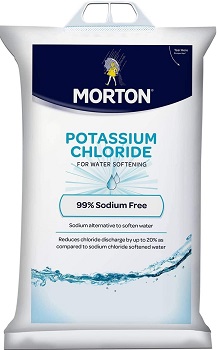

Morton Potassium Chloride Pellets are a type of potassium chloride that comes in pellet form. Since much less pollution is released into the atmosphere due to the lower chloride discharge, these pellets are very eco-friendly. Potassium-based water softener salts will set you back further, as they are not cheap. The quality of this Morton product, on the other hand, could easily justify the cost. It’s packaged in a 40-pound bag that should last a month, give or take.
- Decreases chloride discharge by up to 20%
- Environmentally friendly
- Prevents scale build-up in your home plumbing and appliances
- Removes unwanted minerals from your hard water
- Whitens and softens the clothing and towels
- Soaps, shampoos, and detergents can lather up better
- The packaging is difficult to lift and hold.
- Finding it in local stores is a challenging task.
2. Nature’s Own Water Softener Potassium Solution
Not everybody is a fan of sodium-based goods. Some people are worried about the impact it would have on kidney function and other possible health problems. Even though there is no evidence that sodium-based salt harms the average person’s health, people with kidney issues should avoid it. This salt is a good option if you want to avoid sodium in general.
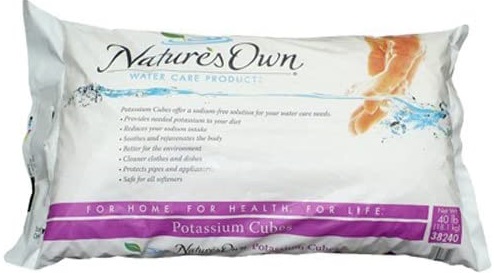

Some consider potassium salts to be a better alternative to sodium. Potassium-based salts, in any case, have a lot to do. First, they’re equally effective at keeping the water softener’s ability to minimize or remove water hardness. Potassium is also healthier for plants than sodium. They’re much safer for the ecosystem.
One of the most obvious reasons people choose potassium-rich water is to ensure that they achieve their dietary potassium goals. This one performs similarly to a sodium-based salt in terms of consistency so that you can expect good results. Potassium chloride weighs 40 pounds in the container for this product. Since potassium salts are not produced on a large scale like sodium salts, this choice would be more costly.
- Convenient and straightforward
- It is more steady and lasts longer
- There is no slimy sensation
- Potassium chloride weighs 40 pounds
- ability to minimize or remove water hardness
- Crystals contain impurities.
3. Diamond Crystal Solar Naturals Water Softener Salt
Most reviews consistently place Diamond Crystal Solar Naturals Water Softener Salt at the top. For its consistency and efficiency, this product is often compared to Morton salt. However, many people prefer this brand and model to others because solar and natural salt crystals are safer and more effective for water softening than rock salt.
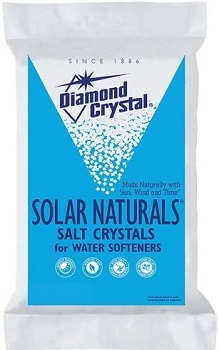

Because of its effectiveness, this natural salt crystal product is both practical and cost-effective. It will not cause salt bridging, which is the formation of a hard crust in the brine tank that causes inappropriate regeneration. You don’t have to be concerned about this because the salt will not harden or shape. In this case, you can be assured that your water softener will work properly.
This salt may also be used for a variety of purposes. It can be used to grade the quality of delicate vegetables, process meat or poultry, and cured pickles and olives. If these advantages appeal to you, you should check them out. A polyethylene bag with polyethylene film liners protects the product from humidity and moisture.
- More efficient and less polluting
- No bridging, channeling, or mushing as a result of this process.
- It’s ideal for consistently grading delicate vegetables, as well as curing pickles and olives.
- Can be used to process meat or poultry.
- Bag made of polyethylene that keeps moisture out.
- Too high product’s price, especially the shipping costs.
4. Diamond Crystal Water Softener Salt, Bright & Soft Series
This is an excellent option if you’re looking for water softener salt pellets. It has a purity level of 99.8%, indicating that it contains no chemicals that could damage the water treatment system. The pure pellets will also help ensure that your water flows smoothly and that your water softener runs efficiently.
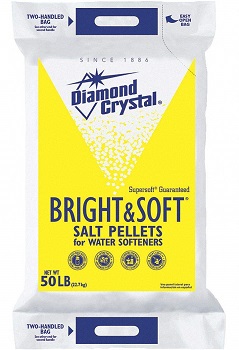

Aside from efficiency, this product has other advantages. These sodium chloride pellets may help remove hard minerals like calcium, iron, barium, and magnesium from a plumbing system’s fixtures, faucets, showerheads, and sinks. Which would otherwise cause corrosion, spots, and scales. It can even help you avoid stains on your clothes and improve the lather of your soaps.
These pellets will also help to improve the health of your hair, scalp, and skin. Your water softener will be able to perform at its best and enhance the consistency of your water. As a result, your hair will be cleaner and shinier, and you will have a less itchy scalp and dry skin. If you have sensitive skin in your family, you can use these pellets to treat and improve your water’s consistency. These are the best salt pellets for water softeners. They come in a 50-pound pack, making them a cost-effective option if you don’t want to purchase salt too often.
- Ensures that the water flows smoothly
- Hard minerals such as iron, calcium, and other minerals can be removed
- Improves hair, scalp, and skin health
- Package in a 50-pound bag.
- Help avoid stains on clothing and bad soap lathering.
- The bag is not easy to open
- Bit expensive
5. Morton Pure and Natural Water Softening Crystals
You may have come across these softening crystals when searching for the best form of salt for a water softener, which is favored by many homeowners who want a safer and more effective solution. Bridging, mushing, or channeling would not occur as a result of them. Otherwise, due to the decreased water flow or salt set in the softener, the efficiency of your water softener can be reduced. These are common problems with other salt products, but not with the Morton U26624S.
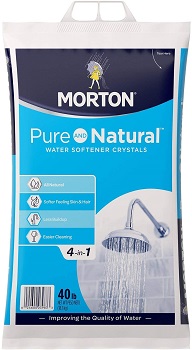

Additionally, there are no additives or extenders in this sodium chloride oil. It is pure and efficient, making it one of the most dependable products in the category. You also don’t have to be concerned about salt crystallization damaging your softener. Furthermore, since this product enhances soap lather, your clothes can feel smoother and cleaner. Not only will your clothes prosper, but your skin and hair will as well.
The Morton softening crystals, which come in a 40-pound bag, are also naturally harvested from saltwater and are suitable for all forms of water softeners. You can also be assured that your appliances can last longer if you use this product because hard water spots will not form in them.
- No fillers in this product since it is harvested naturally
- Compatible for all forms of water softeners
- No bridging, channeling, or mushing.
- The appliances will last longer.
- Excellent for washing, skin, and hair.
- Comparatively expensive
6. Morton Clean and Protect II Water Softening Pellets
When it comes to water softeners, Morton has a well-deserved good reputation. When you hear this manufacturer’s name, you know you’re going to get high-quality goods. Let’s take a closer look at what this product has to offer. It dissolves all hard metal components or particles that build up in appliances, reducing their lifespan. As a result, you can have a long experience with the appliance if you use it in this manner.
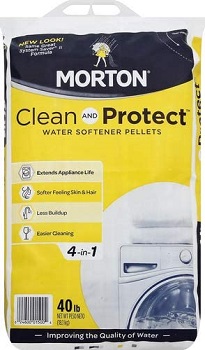

Since this salt is in the form of pellets, it can be used for a more extended period. The use of it is the second crucial point to note. It can be used for various purposes, but water softening is one of the most common. Fill the water softener with these salt pellets, and the build-up will be reduced. You and your water softener would be healthy as a result of this. It contributes to the water softener’s longer life span. The bag contains around 40 pounds of pellets, which should last you a long time because Morton is known for providing excellent service.
- Easier to hold and pour salt.
- Enhances the quality of appliances that use water.
- Help you save money on maintenance and replacement parts
- Bag contains around 40 pounds of pellets
- Hard metal components
- Price is high
Things to Consider Before Buying Water Softener Salt
Water Softener Salt For High Iron
Some water softening salts claim to be able to extract iron from water. But there is very little detail about how the salt works to remove more iron from a system. The ion exchange mechanism is the same regardless of which form of softening salt you use in your water softener. Sodium ions replace calcium and magnesium minerals. Ion exchange is incapable of eliminating rust-causing compounds in water, such as iron, so water softeners won’t help you avoid rust in your appliances.
You will need a water filter or a reverse osmosis device to extract rust-causing compounds from your water. These remove minerals that cause hard water and contaminants and impurities that can harm water quality and taste.
Water Softener Salt For Well Water
So far, we’ve mainly concentrated on determining the best salt for people who get their water from a municipality. The tips above still apply when looking for a suitable water softener salt for well water, but there are a few things to bear in mind.
To begin, if you have a private well, you should test the water quality regularly. You must also think about things like the well’s construction efficiency, the state of the well’s maintenance, what industrial activities are taking place near the well. These considerations will help you choose the right filtration system for your home, including which salt to use in your water softener.
Price
You can use a variety of salts in your water softener, which is surprising. The truth is that most people would go for the cheapest option or buy whatever kind of salt they can find without pausing to read labels.
The aim could be to save money by choosing the cheapest option, but keep in mind that low-quality salt means more maintenance for your water softener. Look through the material, do some research, and buy the salt that gives you the most bang for your buck.
Health
Because of their early arrival on the market, sodium-based salts are more common. However, due to the harmful effects of eating so much sodium, people are becoming more health-conscious. You can use a potassium-based water softener salt for your machine if you want to cut down on sodium in your diet.
Additionally, if you or someone in your family has kidney stones, you should stop using sodium in your drink. On the other side, potassium chloride reduces blood pressure. When anyone in your family has a history of low blood pressure, you should avoid using it. Before you go out and buy the salt, think about your family’s wellbeing first.
Environment
If you care about the climate, potassium-based salts might be the way to go. Sodium-based salts pollute the atmosphere by leaving a trace of sodium-rich waters. Potassium, on the contrary, is consumed by plants and is needed for their survival. To protect the atmosphere, use a softener dependent on potassium.
Performance
What you want is a good performance from your water softener salt. What good is it to spend your hard-earned money on a softener salt that can’t fully protect your family’s health? Often check the salt’s effectiveness for your particular water softener system; compatibility is crucial. If you’re not sure what kind of salt your machine needs, contact the manufacturer for more details. If you have a big machine, make sure to purchase enough to get the best results.
How to Add Salt to Water Softener
If your water softener’s tank has enough salt, it will automatically regenerate, which means water will flow back into it, clearing out any impurities and avoiding corrosion and other tank issues. The regeneration process is usually scheduled for a period when your softener will not be used, such as overnight. The time it takes for a device to recover completely is generally between 10 and 30 minutes. If your water softener is low on salt, you will need to regenerate the system manually. For this, you’ll need a cloth or rag, as well as salt for water softeners.
- Start by scrubbing the interior of your brine tank with a wet cloth or rag to remove the brine and salt build-up. Before you apply more softening salt to the tank, make sure it’s as safe as possible.
- After that, you’ll need to top up your brine tank with more water. Remember to set your water level according to your product’s manual instructions or as recommended by your plumber.
- Then fill the brine tank with salt. The amount of salt you’ll need will vary depending on the tank’s size, but you should try to fill it halfway. Unless your product manual specifies otherwise, keep the salt 3 to 4 inches above the water level.
- Finally, locate your system’s control panel and push the manual regeneration button. The machine will then begin to regenerate, which should take anywhere from 10 to 30 minutes. You shouldn’t use the system’s water until it has fully regenerated.
Even if you remember to fill your salt tank for your system’s natural regeneration, it’s always a good idea to clean it out regularly. That will help you to make sure that your softener works properly and lasts as long as possible.
Frequently Asked Questions
How long does it take a water softener to degrade?
It is determined by when you purchased your softener, how much you paid for it, the company that made it, and the nature of the components. Newer water softeners are designed to last longer, so if you have an older model, it will most likely not last as long as the current ones on the market. With proper care and maintenance, the best water softeners will last up to 20 years. It should be noted that the consistency of your household’s water can affect the lifetime of your water softener.
In my brine tank, can I combine different salts?
You might find that you buy various brands and types of salt for your water softening device month after month, which means you’ll have to mix one form of salt with another when it’s time for a salt top-up. In most cases, this isn’t an issue. Since manufacturers of water softeners and water softening salts don’t require you to use the same brand or form of salt over the system’s life, most salts are perfect to combine and won’t cause any problems.
My softener is filled with salt, but my water is still hard. So, what’s the story here?
First and foremost, make sure your water hardness settings are correct on your setup. Your settings may suggest that your water is softer than it is, causing your machine to use less softening salt in the ion exchange process. As a result, there may not be enough sodium in your water to absorb all of the calcium and magnesium minerals, and some may remain. Still, you could have added salt to your softener right before it regenerated, resulting in the salt not having enough time to dissolve. Check for bridging in your salt tank, which occurs when a salt crust forms in the tank and prevents sodium from being absorbed into the brine water.
Is it possible to use food-grade salt in a water softener?
Yes, technically speaking. This, however, is not advised. Although cooking salt is sodium salt, which can regenerate resin, it contains some impurities that can damage your computer. The risk varies depending on your water softener. However, it’s still a safe idea to buy salt made especially for water softeners, which isn’t any more expensive per pound than table salt.
What do you do if salt bridges form in my tank?
Don’t worry if you see some salt bridges; there’s a simple solution. The simplest solution is to smash the bridges with a broomstick or similar tool. Make sure you do it before there are none left, as they will prevent water softening from working correctly. If you see the bridges forming for the first time, you’ll almost certainly see them again and more often. To avoid this, consider switching to a different brand and model of salt or having your machine inspected.
When I’m not using it, how do I store my softening salt?
It’s best to handle softening salt like common salt when it comes to storage. This means you’ll need to store it somewhere warm and dry. If the salt in the bag gets hot, it can dissolve and/or clump up. If this occurs, you will be practically flushing your money down the toilet. Air moisture may also harm softening salts. Keeping your salt in an airtight jar is a good idea. Salt should not be stored below freezing temperatures.
Final Recap
To summarize what we’ve seen in our water softening salt reviews, the best salt has a high purity level and a low level of insoluble material. If your water isn’t too hard, either sea salt or evaporated salt will satisfy. If your water is particularly rough, we suggest using evaporated softener salt, which has less insoluble content. But if you ask us which one is the best water softener salts, we would go for a Morton product.
Finally, keep in mind that you get what you pay for most of the time. You can pay more in maintenance later if you save money on softener salt. With the right accessories, you can keep your best water softener in top condition.
